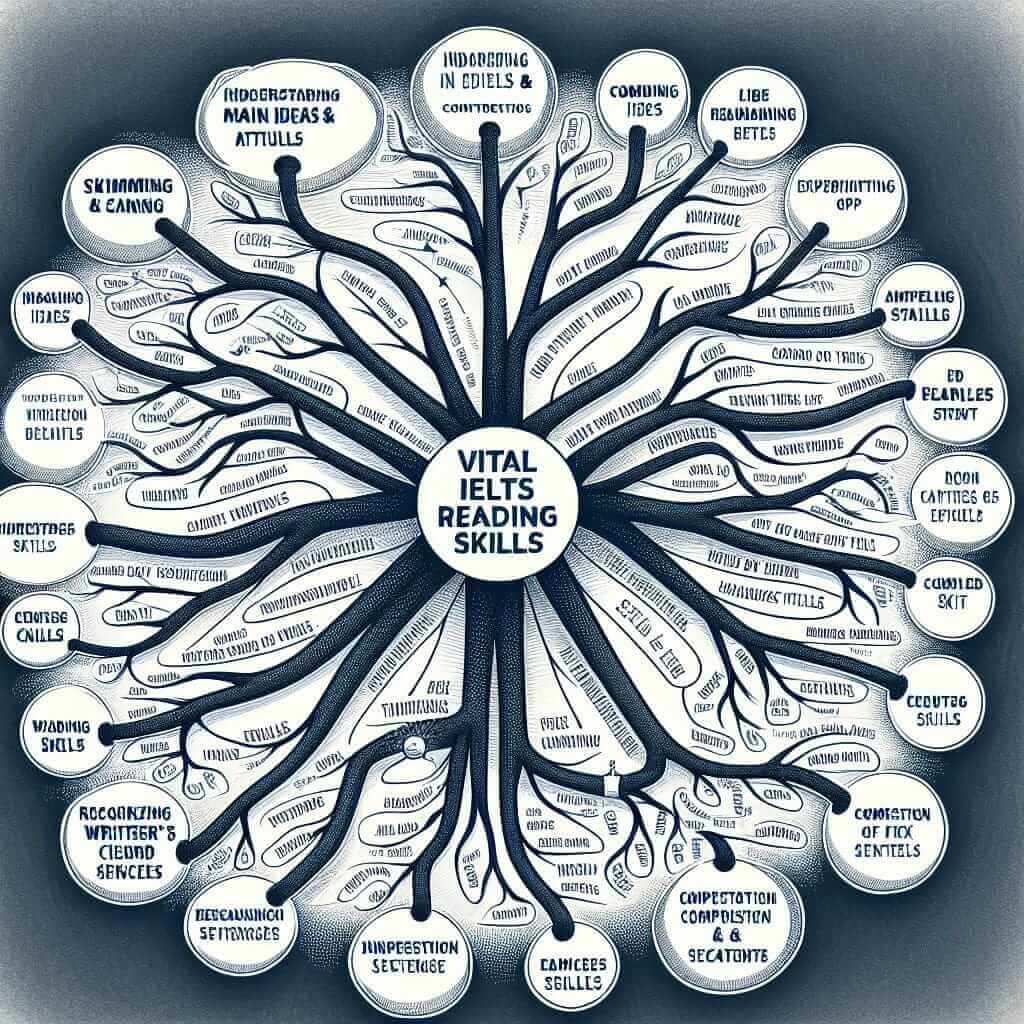The IELTS Reading section is a critical part of the IELTS examination, designed to assess a candidate’s ability to read and understand written English across various contexts. Effective reading skills are essential not only for achieving a high score on the test but also for real-life application in academic, professional, and everyday settings. In this article, we will explore the essential reading skills required for the IELTS exam, provide illustrative examples, and offer practical tips for applying these skills to achieve your desired score.
Understanding IELTS Reading Skills
The IELTS Reading module comprises several skills that enable test-takers to comprehend and interpret texts efficiently. These skills include:
- Skimming and Scanning
- Understanding Main Ideas and Details
- Inferring Meaning from Context
- Recognizing Writer’s Opinions and Attitudes
- Comprehension of Complex Sentences
Skimming and Scanning
Skimming is reading rapidly to get an overview of the text or to understand the general idea. It’s like flying over the material to grasp the main concepts without paying too much attention to details.
Scanning is a technique used to find specific information quickly. It involves running your eyes over the text to locate particular facts or figures.
Example Exercise:
Read the first paragraph of a scientific article quickly to get an overall idea. Then, scan the text to find a specific year mentioned.
Understanding Main Ideas and Details
Understanding the main idea involves identifying the primary argument or point of a passage, while details support and expand upon the main idea.
Example Exercise:
Read a passage about renewable energy and identify the main idea. Then, list the supporting details that explain how solar energy is harvested.
Inferring Meaning from Context
Contextual inference is the ability to deduce the meaning of unfamiliar words or phrases based on surrounding text.
Example Exercise:
Read a passage containing the word “photosynthesis,” which you may not know. Use the context around the word to infer that it is related to plants and sunlight.
Recognizing Writer’s Opinions and Attitudes
Understanding a writer’s opinion or attitude involves detecting the tone, mood, or perspective conveyed in the text.
Example Exercise:
Read a review of a book and determine the reviewer’s attitude towards the book. Is it positive, negative, or neutral?
Comprehension of Complex Sentences
Complex sentences often contain multiple clauses and advanced vocabulary, making them challenging. Efficient comprehension requires understanding the structure and meaning of such sentences.
Example Exercise:
Break down a complex sentence from an academic journal into simpler parts to understand its overall meaning.
Applying These Skills to IELTS Reading
Example 1: Skimming and Scanning in Action
Task: Read a passage about the history of computing and find the year the first personal computer was introduced.
Exercise: Quickly skim the passage to get a general understanding. Then, scan for specific years mentioned to locate the information efficiently.
Example 2: Identifying Main Ideas and Supporting Details
Task: Read a passage about climate change and identify the main idea.
Exercise: Summarize the main argument. List supporting details like examples of climate change effects or statistics provided.
Example 3: Inferring Meaning from Context
Task: Understand the word “ephemeral” used in a passage about art.
Exercise: Read the surrounding sentences to infer that “ephemeral” means something that is temporary or short-lived.

Common Mistakes and How to Avoid Them
- Over-reliance on First Impressions: Do not assume you understand a passage based on a quick glance. Always confirm comprehension by re-reading critical parts.
- Ignoring Keywords: Keywords can guide you to the right answer quickly. Practice identifying and using keywords effectively.
- Misinterpreting Context: Ensure that you are correctly using context to infer meanings. Practice with varied texts to improve this skill.
Practice Strategies for IELTS Reading
- Time Management: Allocate a specific amount of time for each passage and stick to it. Practice timing yourself.
- Practice with Diverse Materials: Use a variety of reading materials, including newspapers, scientific journals, and literature, to expose yourself to different writing styles.
- Annotate Texts: While practicing, make notes in the margins to help you remember key points and structure.
Conclusion
Mastering the IELTS reading skills is essential for achieving a high score in the test. By incorporating these strategies into your study routine, you can improve your reading comprehension and tackle the IELTS Reading section with confidence. Remember, consistent practice and deliberate focus on enhancing these skills will significantly contribute to your overall language proficiency and test performance.
Feel free to share your thoughts or ask questions in the comments section below, and explore more resources on our website to further enhance your IELTS preparation journey.
Happy studying!